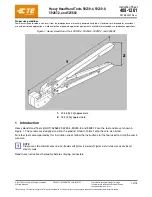
TROUBLE SHOOTING
Providing all maintenance conditions have been met, follow this systematic approach to diagnosis.
1.
NO OPERATION WHEN TRIGGER IS DEPRESSED
a.) Check powerunit power source.
b.) Control cord may be loose or damaged.
c.) Faulty trigger. Replace.
d.) Check hydraulic couplings; tighten, repair or replace.
2.
SLOW OR PARTIAL OPERATION WHEN TRIGGER IS DEPRESSED
a.) Low hydraulic pressure. Check powerunit, adjust.
b.) Cylinder Piston o’ring (405875) could be worn or damaged. Replace.
c.) Excessive wear or scoring on moving parts. Check and replace faulty parts.
3.
TOOL OPERATES IN REVERSE
a.) Tool stops in back position. Hydraulic hoses are reversed. Correct.
4.
HYDRAULIC OIL OVERHEATS
a.) Powerunit motor rotation reversed. Electrical connections reversed. See powerunit instruction manual.
b.) Restrictions in either hydraulic lines, hoses or couplings. Check and tighten, clean or replace.
5.
OIL LEAKAGE
a.) Hydraulic oil leaks from connections. Tighten threaded connections. Do not use Teflon® tape.
b.) Oil leaks from tool. Determine source of leak and replace worn or defective o’rings and back-up rings.
6.
PINTAIL GROOVES STRIPPED DURING PULL STROKE
a.) Tool must be pushed onto fastener fully.
b.) Chips may have collected in chuck jaws. Disassemble nose assembly, clean jaws in mineral spirits or use a sharp
pointed object to remove chips. Relube surfaces jaws ride on.
c.) Chuck jaws may be worn or damaged. Replace.
d.) Pintail too short for jaws to properly grip. Select proper grip length fastener.
e.) Excessive gap between sheets. Reduce gap before attempting to install fastener.
7.
NOSE ASSEMBLY WON'T ACCEPT FASTENER PINTAIL
a.) Spent fastener stem may be jammed in pulling head. Disassemble and check for worn or broken parts in nose
assembly. Replace defective parts, clean and relube jaws before reassembling.
OVERHAUL
If a tool is performing poorly or leaking badly, a complete overhaul may be necessary. Service Kit 208100 contains a complete
set of o’rings, back-up rings and screws.
Perform overhaul in a clean, well lit area using care not to scratch or nick any smooth surface that comes in contact with
an o’ring. Use of Lubriplate® (GBP part no. 402723) or other lubricant is recommended during reassembly to prevent tearing
or distorting of o’rings.
Disconnect hydraulic hoses and electrical cord or air line from powerunit. Remove couplers from hoses and drain. Push
piston (510315) back into cylinder (510314) to empty all fluid from tool. Push piston back to the front of cylinder.
Unscrew socket head cap screw (206118) from retaining ring (208117) using a spanner wrench to remove retaining ring.
Push piston back until cylinder cap (208115) falls out of cylinder. Push piston (510315) out the rear of the cylinder. Remove
loading valve (510316) from the piston. Using a small blunt object, remove o’rings and back-up rings from components.
Clean parts in mineral spirits or other o’ring compatible solvent being sure to clean o’ring grooves. Inspect components for
scoring, excessive wear or damage.
Reassembly sequence is opposite of disassembly. Be sure relative positions of o’rings and back-up rings are as shown in
exploded view and parts list. Relief valve must be installed with flats towards the rear and must enter notch in the rear of
adapter. Coat hose fitting threads with a non-hardening teflon thread compound such as Slic-tite® (GBP part no. 403237).
DO NOT USE TEFLON TAPE.
WARNING:
Always ensure that your powerunit is set at the correct pressure. See owners manual for complete instructions.
Use Gage Bilt pressure setting kit # 942280 should valve adjustment be necessary.
5

























